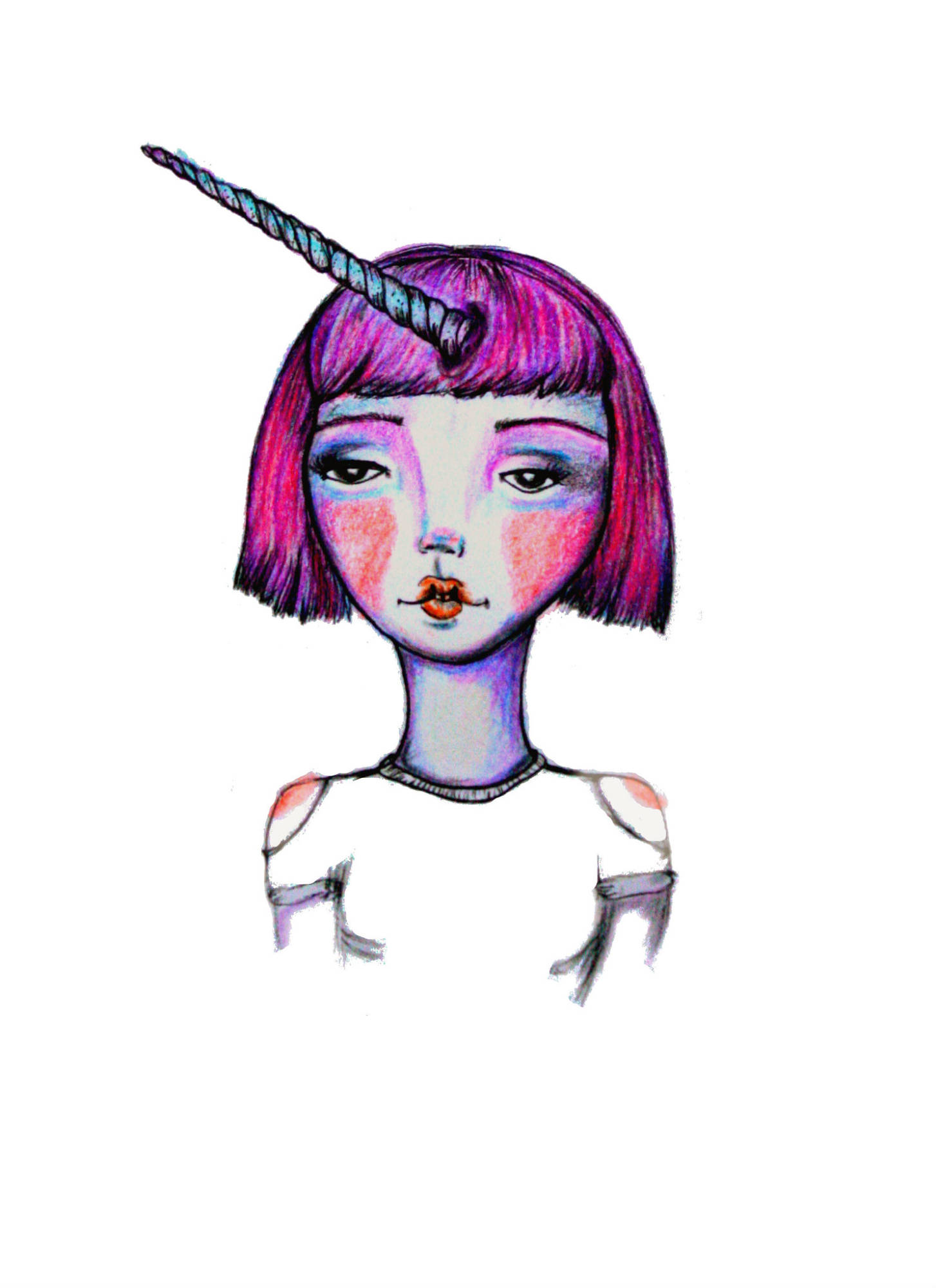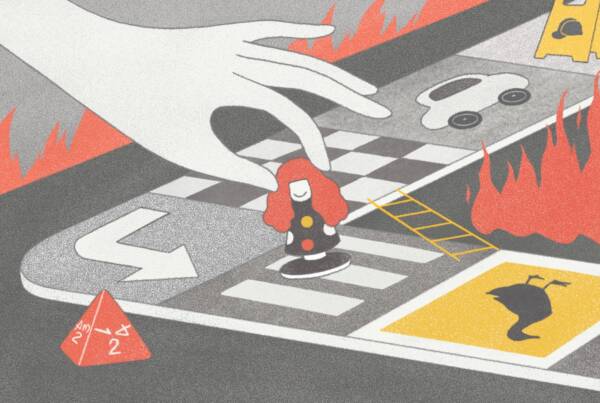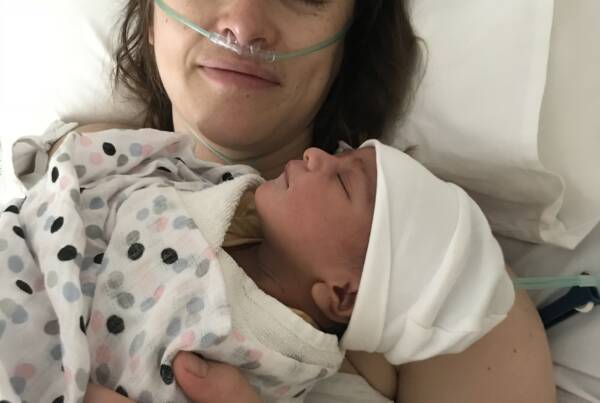Writing by Hannah Forsdike // illustration by Jenny Pereira // So, should we commend pseudo girl power moments in media for spiraling us towards more diverse female roles and story lines, or condemn them for giving us the illusion of feminist story telling?
Writing by Hannah Forsdike // illustration by Jenny Pereira
What we see in movies and on TV shows strongly reflects social hot topics and political issues of the time of production. In many ways, this form of media chronicles social movements throughout recent history. All forms of art and created works have been utilised to convey social messages. Movies and TV shows have also resolved to follow social trends to appeal to their target audience.
The modern wave of feminism demands more honest and diverse female representation in our films and TV shows. Devices like the Bechdel Test calls out media that attempts to pigeon hole women into two dimensional roles that only exist to further the story arch of the male protagonist.
We can see the rise in popularity of feminism reflected in the movies and TV shows that quickly attempted to start filling this void with faux or forced girl power characters and stories.
Faux feminist movies that glorify these pseudo girl power moments don’t seem to truly attempt to diversify the representation of women on screen. It sometimes feels like they are more likely trying to jump on a band wagon to attract an audience or check off a box. It can also feel like a bit of a virtue signal from the producers, like “Hey everyone! Look how PC we are!”
When Netflix originals aimed at a younger, teen audience tack on these girl power moments, they can feel slightly out of place. And although there is something vaguely fascinating about remaking a popular male dominated franchise with an all female cast, this isn’t hitting the mark for creating diverse and honest female characters and stories. Rather, it dredges up something everyone has seen before and creates an unnecessary rift between the original and the movement that inspired the remake. I see a lot of publications that cover feminism in pop culture absolutely tear these movies and TV shows to pieces. But I’m not sure it’s fair for us to do that.
In many ways, we are currently in a transitional period. Social values are really shifting and the people are calling out the lack of empathy and awareness that was once the norm. For the most part people are trying to be better, but none of us are perfect. I am not a perfect feminist, so why should I expect my movies and TV shows to give perfect representation?
There has been a noticeable shift in the representation of women, and each year more and more brilliant stories are being shared. We could dwell on every time something on screen doesn’t meet our morally superior standards, or we could celebrate this shifting culture and anticipate what’s to come. This same theory could be applied to LGBTQ+ and culturally diverse representation.
Social media gives us the ability to self publish our unfiltered opinions on everything. It gives us the power to spew negativity and hate, which is the exact opposite to the empathy based ideals of social betterment. So, should we commend pseudo girl power moments in media for spiraling us towards more diverse female roles and story lines, or condemn them for giving us the illusion of feminist story telling? I’m not actually sure what the correct answer is. I think it is important to recognise when something could be better, but in doing this I don’t think we need to drag down an industry that is trying to move with the times.
What we see in movies and on TV shows strongly reflects social hot topics and political issues of the time of production. In many ways, this form of media chronicles social movements throughout recent history. All forms of art and created works have been utilised to convey social messages. Movies and TV shows have also resolved to follow social trends to appeal to their target audience.
The modern wave of feminism demands more honest and diverse female representation in our films and TV shows. Devices like the Bechdel Test calls out media that attempts to pigeon hole women into two dimensional roles that only exist to further the story arch of the male protagonist.
We can see the rise in popularity of feminism reflected in the movies and TV shows that quickly attempted to start filling this void with faux or forced girl power characters and stories.
Faux feminist movies that glorify these pseudo girl power moments don’t seem to truly attempt to diversify the representation of women on screen. It sometimes feels like they are more likely trying to jump on a band wagon to attract an audience or check off a box. It can also feel like a bit of a virtue signal from the producers, like “Hey everyone! Look how PC we are!”
When Netflix originals aimed at a younger, teen audience tack on these girl power moments, they can feel slightly out of place. And although there is something vaguely fascinating about remaking a popular male dominated franchise with an all female cast, this isn’t hitting the mark for creating diverse and honest female characters and stories. Rather, it dredges up something everyone has seen before and creates an unnecessary rift between the original and the movement that inspired the remake. I see a lot of publications that cover feminism in pop culture absolutely tear these movies and TV shows to pieces. But I’m not sure it’s fair for us to do that.
In many ways, we are currently in a transitional period. Social values are really shifting and the people are calling out the lack of empathy and awareness that was once the norm. For the most part people are trying to be better, but none of us are perfect. I am not a perfect feminist, so why should I expect my movies and TV shows to give perfect representation?
There has been a noticeable shift in the representation of women, and each year more and more brilliant stories are being shared. We could dwell on every time something on screen doesn’t meet our morally superior standards, or we could celebrate this shifting culture and anticipate what’s to come. This same theory could be applied to LGBTQ+ and culturally diverse representation.
Social media gives us the ability to self publish our unfiltered opinions on everything. It gives us the power to spew negativity and hate, which is the exact opposite to the empathy based ideals of social betterment. So, should we commend pseudo girl power moments in media for spiraling us towards more diverse female roles and story lines, or condemn them for giving us the illusion of feminist story telling? I’m not actually sure what the correct answer is. I think it is important to recognise when something could be better, but in doing this I don’t think we need to drag down an industry that is trying to move with the times.
What we see in movies and on TV shows strongly reflects social hot topics and political issues of the time of production. In many ways, this form of media chronicles social movements throughout recent history. All forms of art and created works have been utilised to convey social messages. Movies and TV shows have also resolved to follow social trends to appeal to their target audience.
The modern wave of feminism demands more honest and diverse female representation in our films and TV shows. Devices like the Bechdel Test calls out media that attempts to pigeon hole women into two dimensional roles that only exist to further the story arch of the male protagonist.
We can see the rise in popularity of feminism reflected in the movies and TV shows that quickly attempted to start filling this void with faux or forced girl power characters and stories.
Faux feminist movies that glorify these pseudo girl power moments don’t seem to truly attempt to diversify the representation of women on screen. It sometimes feels like they are more likely trying to jump on a band wagon to attract an audience or check off a box. It can also feel like a bit of a virtue signal from the producers, like “Hey everyone! Look how PC we are!”
When Netflix originals aimed at a younger, teen audience tack on these girl power moments, they can feel slightly out of place. And although there is something vaguely fascinating about remaking a popular male dominated franchise with an all female cast, this isn’t hitting the mark for creating diverse and honest female characters and stories. Rather, it dredges up something everyone has seen before and creates an unnecessary rift between the original and the movement that inspired the remake. I see a lot of publications that cover feminism in pop culture absolutely tear these movies and TV shows to pieces. But I’m not sure it’s fair for us to do that.
In many ways, we are currently in a transitional period. Social values are really shifting and the people are calling out the lack of empathy and awareness that was once the norm. For the most part people are trying to be better, but none of us are perfect. I am not a perfect feminist, so why should I expect my movies and TV shows to give perfect representation?
There has been a noticeable shift in the representation of women, and each year more and more brilliant stories are being shared. We could dwell on every time something on screen doesn’t meet our morally superior standards, or we could celebrate this shifting culture and anticipate what’s to come. This same theory could be applied to LGBTQ+ and culturally diverse representation.
Social media gives us the ability to self publish our unfiltered opinions on everything. It gives us the power to spew negativity and hate, which is the exact opposite to the empathy based ideals of social betterment. So, should we commend pseudo girl power moments in media for spiraling us towards more diverse female roles and story lines, or condemn them for giving us the illusion of feminist story telling? I’m not actually sure what the correct answer is. I think it is important to recognise when something could be better, but in doing this I don’t think we need to drag down an industry that is trying to move with the times.







